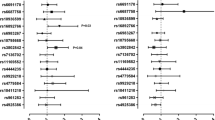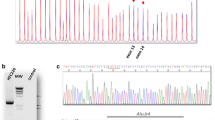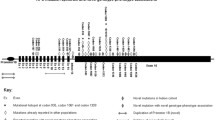Abstract
Germline loss-of-function variants in AXIN2 are associated with oligodontia and ectodermal dysplasia. The association between colorectal cancer (CRC) and colonic polyposis is less clear despite this gene now being included in multi-gene panels for CRC. Study participants were people with genetically unexplained colonic polyposis recruited to the Genetics of Colonic Polyposis Study who had a rare germline AXIN2 gene variant identified from either clinical multi-gene panel testing (n=2) or from whole genome/exome sequencing (n=2). Variant segregation in relatives and characterisation of tumour tissue were performed where possible. Four different germline pathogenic variants in AXIN2 were identified in four families. Five of the seven carriers of the c.1049delC, p.Pro350Leufs*13 variant, two of the six carriers of the c.1994dupG, p.Asn666Glnfs*41 variant, all three carriers of c.1972delA, p.Ser658Alafs*31 variant and the single proband carrier of the c.2405G>C, p.Arg802Thr variant, which creates an alternate splice form resulting in a frameshift mutation (p.Glu763Ilefs*42), were affected by CRC and/or polyposis. Carriers had a mean age at diagnosis of CRC/polyposis of 52.5 ± 9.2 years. Colonic polyps were typically pan colonic with counts ranging from 5 to >100 (median 12.5) comprising predominantly adenomatous polyps but also serrated polyps. Two CRCs from carriers displayed evidence of a second hit via loss of heterozygosity. Oligodontia was observed in carriers from two families. Germline AXIN2 pathogenic variants from four families were associated with CRC and/or polyposis in multiple family members. These findings support the inclusion of AXIN2 in CRC and polyposis multigene panels for clinical testing.






Similar content being viewed by others
Data availability
The datasets generated during and/or analysed during the current study are available from the corresponding author on reasonable request and where individual privacy is not compromised.
References
Lorans M, Dow E, Macrae FA, Winship IM, Buchanan DD (2018) Update on hereditary colorectal cancer: improving the clinical utility of multigene panel testing. Clin Colorectal Cancer 17(2):e293–e305. https://doi.org/10.1016/j.clcc.2018.01.001
Seidensticker MJ, Behrens J (2000) Biochemical interactions in the Wnt pathway. Biochim Biophys Acta 1495(2):168–182
Powell SM, Zilz N, Beazer-Barclay Y et al (1992) APC mutations occur early during colorectal tumorigenesis. Nature 359(6392):235–7
Behrens J, Jerchow BA, Wurtele M et al (1998) Functional interaction of an axin homolog, conductin, with beta-catenin, APC, and GSK3beta. Science 280(5363):596–9
Jho EH, Zhang T, Domon C, Joo CK, Freund JN, Costantini F (2002) Wnt/beta-catenin/Tcf signaling induces the transcription of Axin2, a negative regulator of the signaling pathway. Mol Cell Biol 22(4):1172–1183
Lammi L, Arte S, Somer M et al (2004) Mutations in AXIN2 cause familial tooth agenesis and predispose to colorectal cancer. Am J Hum Genet 74(5):1043–1050
Renkonen ET, Nieminen P, Abdel-Rahman WM et al (2005) Adenomatous polyposis families that screen APC mutation-negative by conventional methods are genetically heterogeneous. J Clin Oncol 23(24):5651–9
Bergendal B, Klar J, Stecksen-Blicks C, Norderyd J, Dahl N (2011) Isolated oligodontia associated with mutations in EDARADD, AXIN2, MSX1, and PAX9 genes. Am J Med Genet A 155A(7):1616–1622. https://doi.org/10.1002/ajmg.a.34045
Marvin ML, Mazzoni SM, Herron CM, Edwards S, Gruber SB, Petty EM (2011) AXIN2-associated autosomal dominant ectodermal dysplasia and neoplastic syndrome. Am J Med Genet A 155A(4):898–902. https://doi.org/10.1002/ajmg.a.33927
Rivera B, Perea J, Sanchez E et al (2014) A novel AXIN2 germline variant associated with attenuated FAP without signs of oligondontia or ectodermal dysplasia. Eur J Hum Genet 22(3):423–6. https://doi.org/10.1038/ejhg.2013.146
Buchanan DD, Clendenning M, Zhuoer L et al (2017) Lack of evidence for germline RNF43 mutations in patients with serrated polyposis syndrome from a large multinational study. Gut 66(6):1170–2. https://doi.org/10.1136/gutjnl-2016-312773
Snover D (2010) Serrated polyps of the colon and rectum and serrated polyposis. In: WHO classification of tumours of the digestive system. IARC, Lyon, pp 160–165
Rosty CBL, Dekker E, Nagtegaal ID (2019) Serrated polyposis. In: WHO classification of tumours of the digestive system. IARC, Lyon, pp 532–544
McLaren W, Gil L, Hunt SE et al (2016) The Ensembl variant effect predictor. Genome Biol 17(1):122. https://doi.org/10.1186/s13059-016-0974-4
Karczewski KJ, Francioli LC, Tiao G et al (2020) The mutational constraint spectrum quantified from variation in 141,456 humans. Nature 581(7809):434–443
Rentzsch P, Witten D, Cooper GM, Shendure J, Kircher M (2019) CADD: predicting the deleteriousness of variants throughout the human genome. Nucleic Acids Res 47(D1):D886–D894. https://doi.org/10.1093/nar/gky1016
Ioannidis NM, Rothstein JH, Pejaver V et al (2016) REVEL: an ensemble method for predicting the pathogenicity of rare missense variants. Am J Hum Genet 99(4):877–885. https://doi.org/10.1016/j.ajhg.2016.08.016
Richards S, Aziz N, Bale S et al (2015) Standards and guidelines for the interpretation of sequence variants: a joint consensus recommendation of the American College of Medical Genetics and Genomics and the Association for Molecular Pathology. Genet Med 17(5):405–424. https://doi.org/10.1038/gim.2015.30
Kopanos C, Tsiolkas V, Kouris A et al (2019) VarSome: the human genomic variant search engine. Bioinformatics 35(11):1978–1980. https://doi.org/10.1093/bioinformatics/bty897
El-Gebali S, Mistry J, Bateman A et al (2019) The Pfam protein families database in 2019. Nucleic Acids Res 47(D1):D427–D432. https://doi.org/10.1093/nar/gky995
Bolger AM, Lohse M, Usadel B (2014) Trimmomatic: a flexible trimmer for Illumina sequence data. Bioinformatics 30(15):2114–2120. https://doi.org/10.1093/bioinformatics/btu170
Li H, Durbin R (2009) Fast and accurate short read alignment with Burrows–Wheeler transform. Bioinformatics 25(14):1754–1760. https://doi.org/10.1093/bioinformatics/btp324
Cibulskis K, Lawrence MS, Carter SL et al (2013) Sensitive detection of somatic point mutations in impure and heterogeneous cancer samples. Nat Biotechnol 31(3):213–9. https://doi.org/10.1038/nbt.2514
Kim S, Scheffler K, Halpern AL et al (2018) Strelka2: fast and accurate calling of germline and somatic variants. Nat Methods 15(8):591–4. https://doi.org/10.1038/s41592-018-0051-x
Beard C, Purvis R, Winship IM, Macrae FA, Buchanan DD (2019) Phenotypic confirmation of oligodontia, colorectal polyposis and cancer in a family carrying an exon 7 nonsense variant in the AXIN2 gene. Fam Cancer 18(3):311–5. https://doi.org/10.1007/s10689-019-00120-0
Liu W, Dong X, Mai M et al (2000) Mutations in AXIN2 cause colorectal cancer with defective mismatch repair by activating beta-catenin/TCF signalling. Nat Genet 26(2):146–7
Cancer Genome Atlas Network (2012) Comprehensive molecular characterization of human colon and rectal cancer. Nature 487(7407):330–7. https://doi.org/10.1038/nature11252
Otero L, Lacunza E, Vasquez V, Arbelaez V, Cardier F, Gonzalez F (2019) Variations in AXIN2 predict risk and prognosis of colorectal cancer. BDJ Open 5:13. https://doi.org/10.1038/s41405-019-0022-z
Macklin-Mantia SK, Hines SL, Chaichana KL et al (2020) Case report expanding the germline AXIN2-related phenotype to include olfactory neuroblastoma and gastric adenoma. BMC Med Genet 21(1):161. https://doi.org/10.1186/s12881-020-01103-0
Wong S, Liu H, Bai B et al (2014) Novel missense mutations in the AXIN2 gene associated with non-syndromic oligodontia. Arch Oral Biol 59(3):349–353. https://doi.org/10.1016/j.archoralbio.2013.12.009
Acknowledgements
We thank Members of the Colorectal Oncogenomics Group and Members from the Genomic Medicine and Family Cancer Clinic for their support of this manuscript. We thank Ms. Lindy Hodgkin, Dr. Ainsley Campbell, Ms. Sian Greening, Dr. Lesley Andrews, Ms. Jasmine Bojadzieva and Dr. Rachel Susman for their contributions to patient recruitment.
Funding
MAJ is an NHMRC Senior Research Fellow. DDB is supported by a NHMRC Investigator Grant (GNT1194896) and the University of Melbourne Dame Kate Campbell Fellowship. Funding from the University of Melbourne Research at Melbourne Accelerator Program (R@MAP) supported the design and conduct of the study, collection, management, analysis and interpretation of data.
Author information
Authors and Affiliations
Corresponding author
Additional information
Publisher’s Note
Springer Nature remains neutral with regard to jurisdictional claims in published maps and institutional affiliations.
Supplementary Information
Below is the link to the electronic supplementary material.
Rights and permissions
About this article
Cite this article
Chan, J.M., Clendenning, M., Joseland, S. et al. Rare germline variants in the AXIN2 gene in families with colonic polyposis and colorectal cancer. Familial Cancer 21, 399–413 (2022). https://doi.org/10.1007/s10689-021-00283-9
Received:
Accepted:
Published:
Issue Date:
DOI: https://doi.org/10.1007/s10689-021-00283-9




